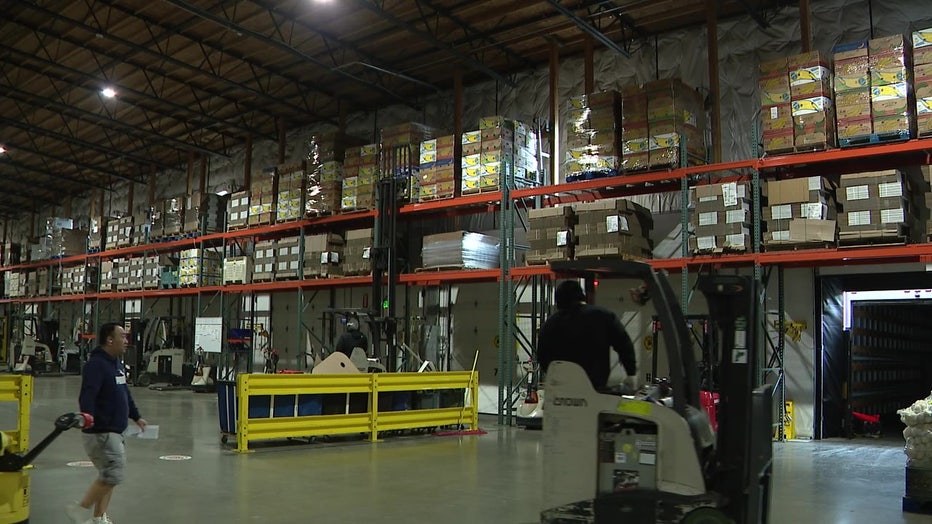7 million pounds of WA food at risk as federal cuts loom
WA food banks bracing for federal budget cuts
Washington food banks are bracing for federal budget cuts, warning that critical programs benefiting tribes, small producers, schools and low-income families are at risk.
SEATTLE, Wash. - Local food banks are bracing for the impacts of federal budget cuts that could result in the loss of 7 million pounds of food. Food Lifeline, which serves 300 food banks across the region and provides assistance to 1.7 million people, is calling for community support as critical programs benefiting tribes, small producers, schools, and low-income families face potential funding reductions.
Last year, Food Lifeline distributed 70 million pounds of food. The anticipated federal cuts represent a 10% decrease in resources, a loss that would significantly affect food distribution efforts.
Mark Coleman, a spokesperson for Food Lifeline warns severe consequences for families already struggling with food insecurity.
"These new cuts are devastating," Coleman said. He says these new cuts are going after programs they've been working with for the last four to five years.
As quickly as food arrives at Food Lifeline, it is packed and shipped to smaller food banks throughout the region. The demand for food assistance has only grown since the pandemic.
"We thought the numbers would go down, but they kept going up because of inflation and supply chain issues," Coleman said.

By the numbers:
According to Food Lifeline, one in eight families in western Washington relies on food banks. The organization warns that cuts to the U.S. Department of Agriculture’s budget will erode this safety net.
The cuts total about $1.9 million in lost funding which the food bank says will affect key programs, including the Local Food for Schools Program, which provides Washington state with $660 million to purchase fresh, healthy food from local farmers for schools and childcare centers.
"Most kids that receive free or reduced lunches, that’s their only hot meal during the day," Coleman added. "The bottom line to all of this is that it's going to be families in western Washington who suffer."
The ripple effects of these budget cuts not only threaten food banks but also the local farmers who have expanded their operations to meet increasing demand.
"Those farms have grown, they've increased their capacity, and now they're not going to get paid for that food, so they're putting our farmers in a bit of jeopardy as well," Coleman said.
Another $500,000 is being cut from TEFAP, a federal program that helps distribute food to low-income communities and $500 million from the Local Food Purchase Assistance Program, both of which help food banks source fresh, local produce.
The Food Research & Action Center warns that proposed policy changes could strip free meal access from 475,000 Washington students, pushing even more families to food banks.
The financial setback comes at a time when food bank visits are up by 20%.
"What does hunger look like?" Coleman asked. "The truth is – it doesn’t show."
He pointed out that many of those seeking assistance are working families struggling with the rising cost of living.
"The majority of them today are families that were just getting by before, before eggs were $7 a dozen, before gas was $4.75 a gallon," Coleman said.
Featured
Gov. Ferguson opposed to wealth tax proposals from legislative Democrats
Speaking to reporters Tuesday, Washington Governor Bob Ferguson said proposals from his colleagues in the House and Senate have "far too much in taxes."
What's next:
Food Lifeline fears that funding cuts will continue, especially as Washington state faces a $12 billion budget shortfall.
"If there are cuts to the state budget, it's going to affect this food safety net. It's going to affect school programs, senior meal programs," Coleman said.
Despite the setbacks, Coleman says Food Lifeline will do it best to recoup the lost funding through other channels. "We always want to make sure we're there when people need us," Coleman said.
That's why they need your help. "Volunteering is critical of us," Coleman said. "It takes us about 15 to 16,000 volunteers every year to sort and repack the donated food that we receive."
We're going to do our best to make up that difference," Coleman said. "We're gonna we're gonna find donors, we're gonna work with foundations and other sources to bring that money back in. But right now, it's kind of devastating"
Want to help? Donate at www.foodlifeline.org/donate or for volunteer opportunities visit Food Lifeline.
The Source: Information in this story is from Food Lifeline, the Food Research & Action Center and FOX 13 Seattle reporting.
MORE TOP STORIES FROM FOX 13 SEATTLE
Teen accused of Spanaway house party murders held on $2 million bail
Deputy police chief of Tacoma fired after investigation
Third measles case confirmed in WA, health officials warn of possible exposure
Richard Sherman's WA home robbed by armed men, deputies confirm
Seattle's ‘Cake ATM’ has customers lining up for sweets
To get the best local news, weather and sports in Seattle for free, sign up for the daily FOX Seattle Newsletter.
Download the free FOX LOCAL app for mobile in the Apple App Store or Google Play Store for live Seattle news, top stories, weather updates and more local and national coverage, plus 24/7 streaming coverage from across the nation.


